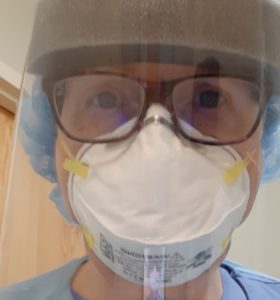Jane Dotson was drawn into the medical field over 25 years ago after her father was involved in a near-fatal auto accident that required months of surgery. The hospital where he dad’s life was saved and where she was born just happened to be the same one where she started her career. Throughout her career, Dotson has worn many different hats and seen many different things. She’s been a hospice nurse, a dementia nurse, a psychiatric nurse and is now a nursing supervisor in a subacute physical rehabilitation center.
The coronavirus pandemic has changed the way her Michigan hospital delivers care, including the halting of visitors per the Governor’s mandate. COVID-19 put an invisible barrier between the caregivers and their patients. “Essentially, we began keeping our patients in a 6-foot invisible ‘bubble’ and were only allowed to enter it to provide direct physical care. We initially isolated all patients in their rooms where all care and therapies were provided. As we learned more about the virus patients have been allowed out of their rooms if they are wearing masks and maintain 6-foot social distancing space,” Dotson said. “A serious side effect of COVID-19 is depression among patients. Since January, we have witnessed an increase in tearfulness and angry outbursts. We attempt to comfort and reassure patients when they are in distress over the social isolation, but comfort hasn’t been well received when it is from a gloved hand, or from 6 feet away.
“One patient I care for is deaf and can lip read but wearing masks limits some of us to only writing to communicate with her. She is attempting to teach us some basic sign language, but she says she misses being able to see people talk and smile.”
The facility that Dotson works in housed and cared for COVID-19 patients for a few weeks in an isolation unit created on a separate wing of the building. Strict entry and exit rules and restrictions were in place for the entire facility, along with additional very strict rules and restrictions within the unit itself. A pervasive fear of the virus resulted in several members of the staff asking not to be placed in the COVID unit.
“I personally believe that if you go into the medical field, you should not be allowed to refuse to give care to someone if you are provided the tools to do so safely,” Dotson said. “So, I agreed to care for COVID-19 patients because I felt it was safer caring for known carriers of COVID-19 patients while wearing full PPE next to coworkers wearing full PPE. Fortunately, none of the COVID caregivers I work with contracted the virus.”
Working in an isolation unit with all the different safety requirements was very stressful for Dotson. Her and her co-workers had to be mindful of every moment during their shift. After a few weeks of caring for COVID-19 patients, Dotson says she and her co-workers became less fearful of the virus and more frustrated with the isolation and the effects on their patients.
“It became emotionally challenging for me because my heart broke for those patients who didn’t have anyone on the outside to call or do window ‘visits’,” Dotson said. “I had one patient tearfully say that she felt like a leper and she just needed a warm hug.”
Thankfully, the COVID-19 unit where Dotson works has been empty for a few weeks now. Dotson hopes that they never need to use it again.
Dotson is from Flint, Michigan and says that their community has come together and has been very supportive of medical personnel since the pandemic began. She sees that unity as a positive that the community can take forward after this chapter.
“I’ve been out in public with my uniform on and have had people thank me for my service to the community. I find it mildly embarrassing but also rewarding,” Dotson said. “Our facility has had numerous donations of PPE and even meals for staff throughout this ordeal. I am happy and proud of our community for the first time in a very long time.”
Things have gone back to normal for Dotson, as much as they can with mandates still in place in the state of Michigan. Long before COVID-19, she was already in the habit of using hand sanitizer frequently and being cautions to not touch her face with her hands. “I know the kinds of microorganisms that lurk in our world and I live in caution, but not fear. I just want to be able to return to a normal life where there are no mandates.”
Dotson said this interview was an unusual opportunity for her to express her thoughts with someone other than a fellow coworker of a family member. She wanted to take the opportunity to pass along this message to the truck driving community: “Thank you for your service to our nation. None of us could survive if there weren’t professional truck drivers on the road day and night. I respect each and every one of you for what you do. You don’t always have it easy, but you keep on trucking. Thank you, ladies and gentlemen.”












Speak Your Mind